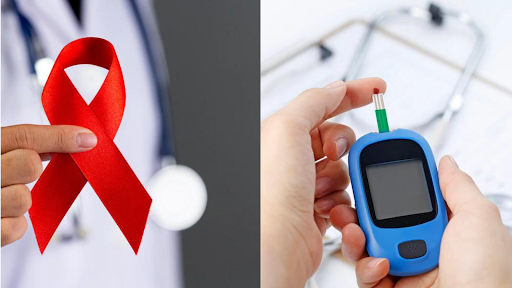
HIV and diabetes are two of the most common chronic conditions in the world, affecting millions of people. In this blog, we will provide you with everything you need to know about both HIV and diabetes, including their history, symptoms, treatments, and why you need to have a regular HIV and diabetes blood test done. Hopefully, this will give you a better understanding of these diseases and how to best care for them.
HIV is an abbreviation for human immunodeficiency virus. HIV is a virus that attacks the immune system and can lead to AIDS. And people with diabetes are at an increased risk of getting HIV because both diseases share common risk factors, such as poor nutrition, advanced age, and homelessness. Diabetes and HIV can also interact in dangerous ways, causing diabetic foot ulcers to become infected with HIV.
There are many symptoms of HIV, but not all people with HIV will experience all of them. Symptoms can vary depending on the stage of the virus in an individual’s body. The most common symptoms of HIV include fatigue, weight loss, muscle aches and pain, fever, swollen lymph nodes, diarrhea, mouth sores, and difficulty breathing. Some people may also have severe AIDS-related illnesses such as Kaposi’s sarcoma or pneumonitis (infection of the lungs).
There is no one-size-fits-all approach to preventing or treating HIV, but there are some general tips that can help. Keep your HIV status confidential, and use a condom every time you have sex to avoid getting HIV. If you are diagnosed with HIV, know how to take your medication and when to see your doctor. And if you have diabetes, monitor your blood sugar levels and take the appropriate medications.
Diabetes is a condition in which the body cannot control the blood sugar level. Diabetes can develop at any age, but it is more common in adults over the age of 50, and thus it is always recommended for such adults to have a regular diabetes blood test done. The most common form of diabetes is type 2, which affects about 85% of people with the disease. Type 1 diabetes is a rarer form that usually develops in children and young adults.
The symptoms of diabetes can vary depending on the person, but they can include: increased thirst, frequent urination, weight loss, fatigue, and blurred vision. If you have any of these symptoms, see your doctor. Diabetes can also lead to heart and nerve damage and other health problems.
Preventing diabetes is as important as treating it because uncontrolled diabetes can lead to serious health problems. You can help prevent diabetes by staying healthy and exercising regularly, eating a balanced diet, and avoiding tobacco smoke. However, you cannot prevent all cases of diabetes, so you also need to get treatment if you have the condition. Diabetes treatment typically includes medication and a diet plan containing fruits and vegetables, lean protein, and whole grains.
HIV and diabetes are both chronic illnesses that can damage your body over time. Getting your blood tests done regularly from a certified blood test lab like Simira Diagnostics can help you monitor your health and catch any problems early. Monitoring your HIV and diabetes medications also helps ensure you’re taking the right dose and not having any side effects.
Copyright © Simira Healthcare Private Limited 2025. All Rights Reserved
This will close in 0 seconds
This will close in 0 seconds
Leave a Reply